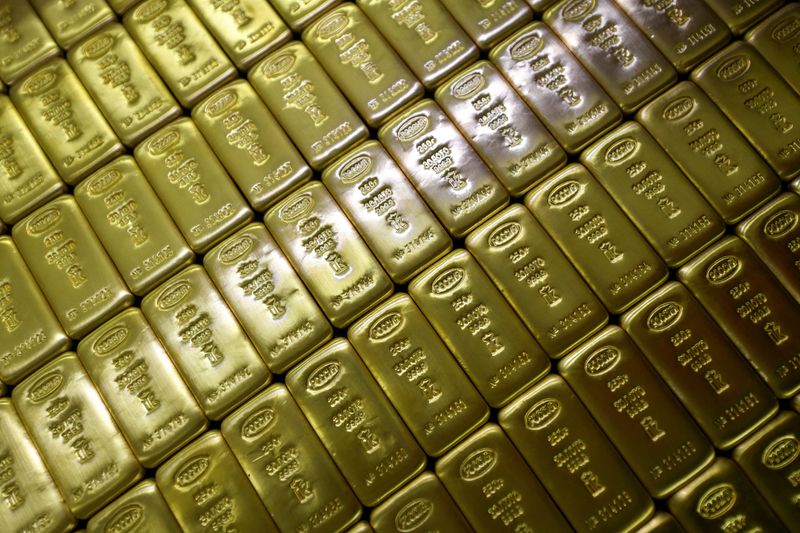By Marc Jones
LONDON (Reuters) - An increasing number of countries are repatriating gold reserves as protection against the sort of sanctions imposed by the West on Russia, according to an Invesco survey of central bank and sovereign wealth funds published on Monday.
The financial market rout last year caused widespread losses for sovereign money managers who are "fundamentally" rethinking their strategies on the belief that higher inflation and geopolitical tensions are here to stay.
Over 85% of the 85 sovereign wealth funds and 57 central banks that took part in the annual Invesco Global Sovereign Asset Management Study believe that inflation will now be higher in the coming decade than in the last.
Gold and emerging market bonds are seen as good bets in that environment, but last year's freezing of almost half of Russia's $640 billion of gold and forex reserves by the West in response to the invasion of Ukraine also appears to have triggered a shift.
The survey showed a "substantial share" of central banks were concerned by the precedent that had been set. Almost 60% of respondents said it had made gold more attractive, while 68% were keeping reserves at home compared to 50% in 2020.
One central bank, quoted anonymously, said: "We did have it (gold) held in London... but now we've transferred it back to own country to hold as a safe haven asset and to keep it safe."
Rod Ringrow, Invesco's head of official institutions, who oversaw the report, said that is a broadly-held view.
"'If it's my gold then I want it in my country' (has) been the mantra we have seen in the last year or so," he said.
DIVERSIFY
Geopolitical concerns, combined with opportunities in emerging markets, are also encouraging some central banks to diversify away from the dollar.
A growing 7% believe rising U.S. debt is also a negative for the greenback, although most still see no alternative to it as the world's reserve currency. Those that see China's yuan as a potential contender fell to 18%, from 29% last year.
Nearly 80% of the 142 institutions surveyed see geopolitical tensions as the biggest risk over the next decade, while 83% cited inflation as a concern over the next 12 months.
Infrastructure is now seen as the most attractive asset class, particularly those projects involving renewable energy generation.
Concerns over China mean India remains one of the most attractive countries for investment for a second year running, while the "near-shoring" trend, where companies build factories closer to where they sell their products, is boosting the likes of Mexico, Indonesia and Brazil.
As well as China, Britain and Italy are seen as less attractive, while rising interest rates coupled with work-from-home and online shopping habits which became embedded during the COVID-19 outbreak meant property is now the least attractive private asset.

Ringrow said the wealth funds that performed better last year were those that recognised the risks posed by inflated asset prices and were willing to make substantial portfolio changes. It would be the same going forward.
"The funds and the central banks are now trying to get to grips with higher inflation," he said. "It's a big sea change."